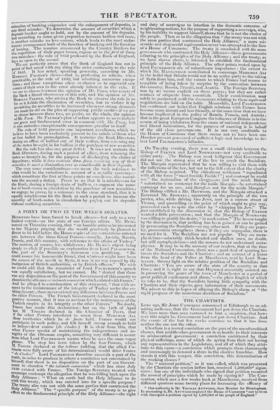On Tuesday evening, there was a small skirmish between the
Bishop of EXETER and Lord Noastaxiiv—not very creditable to either party. The Bishop was most indignant that Government did not use the strong arm of the law to crush the Socialists. The Marquis represented that he was willing to visit them with the inflictions of the law, but not to the full extent that the charity of the Bishop required. The chivalrous nobleman " repudiated with all the force [" most forcible Feeble !"] and contempt he could use" the insinuation of the clergyman; and the meek Bishop " entertained no contempt for the noble Marquis—he entertained contempt for no one, and therefore mmot for the noble Marquis." The Bishop vilified a Mr. HEywoon, and the Marquis attacked a Reverend Mr. SrowELT.; apparently on the principle of the two jarvies, who, while driving two Jews, met in a narrow street of Vienna, and quarrelling on the point of which ought to give way, proceeded each to spite the other by " whipping his Jew." The fret established by the discussion is, that the Bishop of EXETER wanted a little persecution ; and that the Marquis of NoinisaNny was willing to gratify his desire," in moderation." The lesson taught by the discussion is, that nothing has been gained or can be gained by persecuting the Socialists—or any other sect. If they are popular, prosecution strengthens them ; it they are unpopular, there is no need for it. The Socialists are not popular. They arc metaphysicians—miserably thick-headed and shallow ones, no doubt, but still metaphysicians—and time masses do not understand metaphysics. It may be in the memory of our readers, that at the time of the National Convention, there was a good deal of sparring between the Socialists and the Chartists ; and an extract of a letter front the head of the Police at Manchester, read by Lord NOR.* ANEY, throws light on the relative position of the Socialists and Chartists : " Yon are aware of the state of the country at that time ; and it is right to say that Heywood materially assisted me
in preserving the peace of the town of Manchester at a period of great political excitement and alarm,"—the plain English of width we take to be, that the Socialists having little sympathy with the Chartists and their objects, gave information of their movements. \Ye advert to this in hopes of allaying the Bishop's alarm at "the rapid progress of the monstrous doctrines of Socialism."


























 Previous page
Previous page